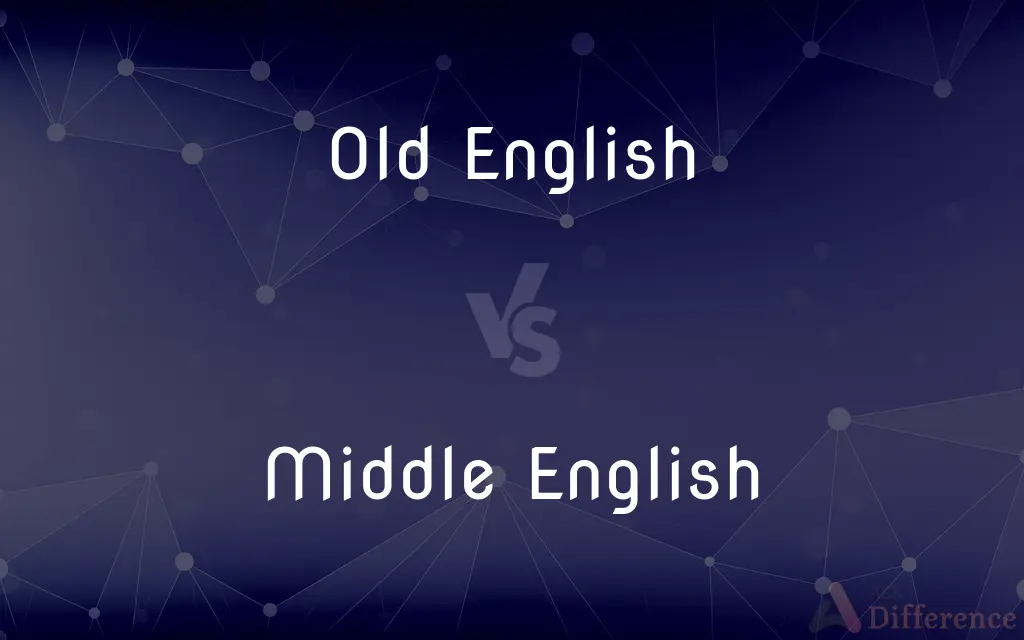Old English vs. Middle English — What's the Difference?
Edited by Tayyaba Rehman — By Fiza Rafique — Published on November 14, 2023
Old English (c. 450-1150 AD) is the earliest form of the English language, while Middle English (c. 1150-1500 AD) evolved after the Norman Conquest.

Difference Between Old English and Middle English
Table of Contents
ADVERTISEMENT
Key Differences
Old English and Middle English are two distinct phases in the history of the English language, each with its unique characteristics. Old English, spoken from approximately 450 to 1150 AD, is the earliest form of the English language. It was heavily influenced by Germanic languages due to the Anglo-Saxon settlement in England. The language during this period had a complex system of inflections and was quite different from modern English. Famous works like "Beowulf" were written in Old English, and reading them today requires specialized study or translation.
Middle English, spoken from around 1150 to 1500 AD, came after the Norman Conquest of 1066. This phase saw a significant influence from French due to Norman rule. The grammar started evolving, and the language became somewhat more recognizable to modern speakers, but still retained many Old English elements. Geoffrey Chaucer's "The Canterbury Tales" is one of the most famous works from this period.
The transition from Old English to Middle English was marked by significant linguistic changes. The grammar simplified, the vocabulary expanded with French and Latin loanwords, and the pronunciation of some letters changed. The change wasn't sudden but rather a gradual evolution over centuries.
Both Old English and Middle English are critical stages in the development of the English language. Understanding them provides insight into how languages evolve over time due to socio-political changes, invasions, and cultural shifts.
Comparison Chart
Time Period
C. 450-1150 AD
C. 1150-1500 AD
ADVERTISEMENT
Major Influences
Germanic languages
French (due to the Norman Conquest)
Grammar
More inflected
Simplified grammar
Famous Works
"Beowulf"
"The Canterbury Tales" by Geoffrey Chaucer
Recognizability to Moderns
Difficult for modern English speakers to understand
Closer to modern English but still requires interpretation
Compare with Definitions
Old English
The language spoken before the Norman Conquest in 1066.
Before the Normans invaded, the people of England spoke Old English.
Middle English
The language with simplified grammar compared to Old English.
The Middle English period saw a decline in case endings and inflections.
Old English
A language with complex inflections and distinct vocabulary.
In Old English, the word for king was cyning.
Middle English
A transitional phase in the evolution of the English language.
Middle English was a bridge between the Old and Early Modern phases of English.
Old English
The linguistic foundation of the English language.
Many words in modern English, like mother, have Old English origins.
Middle English
The form of English spoken in England from c. 1150-1500 AD.
Geoffrey Chaucer's The Canterbury Tales provides a glimpse into Middle English.
Old English
The earliest form of the English language, spoken in England from c. 450-1150 AD.
The epic poem Beowulf is a renowned work written in Old English.
Middle English
English spoken during the medieval period in England.
Medieval literature, like Sir Gawain and the Green Knight, was written in Middle English.
Old English
The language of the Anglo-Saxons, heavily influenced by Germanic roots.
Old English texts showcase a rich linguistic history with Germanic influences.
Middle English
English post the Norman Conquest, with a significant French influence.
Middle English vocabulary expanded with words like council from French origins.
Common Curiosities
Did Old English have standardized spelling?
No, spelling varied widely since written conventions were not standardized.
Are Old English and Anglo-Saxon the same?
Essentially, yes. "Anglo-Saxon" is often used interchangeably with "Old English," although "Anglo-Saxon" can also refer to the people or culture.
What is Old English?
Old English is the earliest form of the English language, spoken in England and parts of Scotland between the 5th and 12th centuries.
How did Old English transition to another form of the language?
Various factors, including the Norman Conquest in 1066, influenced linguistic changes leading to Middle English.
What's a famous Old English work?
"Beowulf" is perhaps the most famous literary work written in Old English.
How was Old English grammar different?
It had a more complex system of declensions and conjugations, similar to modern German.
Is Old English understandable to modern English speakers?
Generally, no. Old English is quite different in vocabulary, grammar, and pronunciation, making it largely unintelligible to contemporary English speakers without study.
From which languages did Old English evolve?
It primarily evolved from Germanic languages brought to Britain by the Angles, Saxons, and Jutes.
Did Old English use a different alphabet?
Mostly the Latin alphabet, but it included several runes and letters not used in modern English, such as "æ" (ash) and "þ" (thorn).
Is Middle English closer to modern English?
Compared to Old English, yes. Many Middle English texts, especially those from the late Middle English period, are more accessible to modern readers.
Were there dialects in Old English?
Yes, there were several dialects, including West Saxon, Mercian, Northumbrian, and Kentish.
What is Middle English?
Middle English is the form of the English language spoken in England from approximately the late 12th century to the late 15th century.
Did Middle English have standardized spelling?
No, spelling remained non-standardized and was often phonetic or regional.
How did vocabulary change in Middle English?
Many Old English words remained, but there was a significant influx of Norman French and Latin vocabulary.
How were Old English and Middle English texts preserved?
Many were copied by hand by monks in monasteries before the advent of the printing press.
What's a notable Middle English literary work?
Geoffrey Chaucer's "The Canterbury Tales" is a prominent example.
How did Middle English develop?
It evolved from Old English, heavily influenced by Norman French due to the Norman Conquest.
How did the pronunciation of words change from Old English to Middle English?
There were significant shifts, such as the Great Vowel Shift, which altered the pronunciation of long vowels.
Which events signaled the end of the Middle English period?
The printing of the Gutenberg Bible in 1455 and the introduction of the printing press to England in 1476 played significant roles in transitioning from Middle English to Early Modern English.
Was Middle English only spoken in England?
Primarily, though it was also spoken in parts of Scotland and Wales.
Share Your Discovery

Previous Comparison
Ambassador vs. High Commissioner
Next Comparison
Minerals vs. RocksAuthor Spotlight
Written by
Fiza RafiqueFiza Rafique is a skilled content writer at AskDifference.com, where she meticulously refines and enhances written pieces. Drawing from her vast editorial expertise, Fiza ensures clarity, accuracy, and precision in every article. Passionate about language, she continually seeks to elevate the quality of content for readers worldwide.
Edited by
Tayyaba RehmanTayyaba Rehman is a distinguished writer, currently serving as a primary contributor to askdifference.com. As a researcher in semantics and etymology, Tayyaba's passion for the complexity of languages and their distinctions has found a perfect home on the platform. Tayyaba delves into the intricacies of language, distinguishing between commonly confused words and phrases, thereby providing clarity for readers worldwide.












































